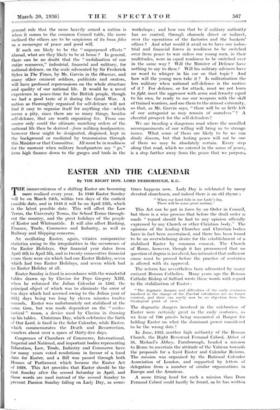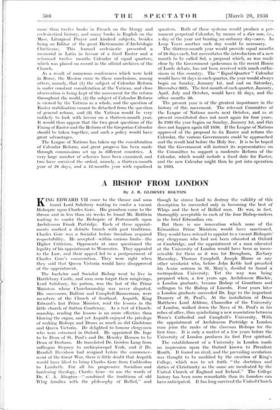EASTER AND THE CALENDAR
By THE RIGHT HON. LORD DESBOROUGH, K.G.
THE inconveniences of a shifting Easter are becoming more realised every year. In 1940 Easter Sunday will be on March 24th, within two days of the earliest i,oSsible date, and in 1948 it will be on April 25th, which is the latest possible date. This will affect the Law Terms, the University Terms, the School Terms through- out the country, and the great holidays of the people of Easter and Whitsuntide. It will also affect Banking, Finance, Trade, Commerce and Industry, as well as Railway and Shipping concerns.
An oscillating Easter, again, vitiates comparative statistics owing to the irregularities in the occurrence of the Easter Holidays. Our financial year dates from April 0ttito.April 5th, and in twenty consecutive financial years there were six which had one Easter Holiday, seven which ,had two Easter Holidays, and seven which had ne Raster Holiday at all.
Easter.Sunday is fixed in accordance with the wonderful tables drawn up by Clavius for Pope Gregory XIII, when he reformed the Julian Calendar in 1582, the principal. object of which was to eliminate the error of ten days which had accrued owing to the. Julian year of 3651 days being too long by eleven minutes twelve seconds., Easter was unfortunately not stabilised at the same time, but was made dependent on the " eccles- iastical ". moon, a device used by Clavius in drawing up his tables. Christmas Day, which celebrates the birth of Our. Lord, is fixed in the Solar Calendar, while Easter, which commemorates the Death and Resurrection, wanders. about over a space of thirty-five days.
Congresses of Chambers of Commerce, International, Imperial and National, and important bodies representing Education, Law, Trade, Industry and Commerce have for many years voted resolutions in favour of a fixed date for Easter, and a Bill was passed through both Houses of Parliament which became the Easter Act of 1928: This Act provides that Easter should be the first Sunday after the second Saturday in April, and these words are used instead of the second Sunday to prevent Passion Sunday- falling on Lady Day, as some- times happens now. Lady Day is celebrated by many devoted churchmen, and indeed there is au old rhyme :
" When our Lord falls in our Lady's lap, There will be some great mishap."
This Act can be put in force by an Order in Council, but there is a wise proviso that before the draft order is made " regard should be had to any opinion officially expressed by any Church or -other Christian body." The opinions of the leading Churches and Christian bodies have in fact been ascertained, and there has been found to be an overwhelming desire for the establishment of a stabilised Easter by common consent. The Church of Rome, however, though it has pronounced that no question of dogma is involved, has intimated that sufficient cause must be proved before the practice of centuries is altered with its approval.
The reform has nevertheless been advocated by many eminent Roman Catholics. Many years ago the Roman Catholic Bishop of Salford wrote these words with regard to the stabilisation- of Easter :
'" Tho dogmatic dangers and difficulties of the early centuries involved. in the change of the Paschal calculation aro no longor existent, and there can surely now be no objection from the theological point of view."
The dogmatic dangers involved in the celebration of Easter were certainly great in the early centuries, as we hear of 700 priests being massacred at Bangor for holding Easter on what, the dominant power considered to be the wrong date !
In June, 1935, another high authority of the Roman Church, the Right Reverend Fernand Cabrol, Abbot of St. Michael's Abbey, Farnborough, headed a mission to Rome to ascertain the attitude of the Vatican towards the proposals for a fixed Easter and Calendar Reform. The mission was organised by the Rational Calendar Association of London, and supported by letters of delegation from a number of similar organisations in Europe and the Americas.
A more fitting head for such a mission than Dom Fernand Cabrol could hardly be found, as he has written more than twelve books in French on the liturgy and ecclesiastical history, and many hooks in English on the Mass, Liturgical Prayer and kindred subjects, besides being an Editor of the great Dictionnaire d'Archeologie Chret icnne. This learned ecclesiastic presented a memorial in Latin in favour of a fixed Easter and a reformed twelve months Calendar of equal quarters, which was placed on record in the official archives of the Church.
As a result of numerous conferences which were held in Rome, the Mission came to these conclusions, among others, namely, that (1) the subject of Calendar Reform is .under constant consideration at the Vatican, and close observation is being kept of the movement for the reform throughout the world, (2) the. subject of Calendar Reform is viewed by the Vatican as a whole, and the question of Easter stabilisation cannot be detached from the question of general reform, and (3) the Vatican would be very unlikely to look with favour on a thirteen-month year. It would thus appear that the two great questions of the Fixing of Easter and the Reform of the Gregorian Calendar should be taken together, and such a policy would have great advantages.
The League of Nations has taken up the consideration of Calendar Reform, and great progress has been made through commissions set up in different countries. A very large number of schemes have been examined, and two have survived the ordeal, namely, a thirteen-month year of 28 days, and a 12-months year with equalised quarters. Both of these systems would produce a per- manent perpetual Calendar, by means of a dies non, i.e., a day of the year not bearing an ordinary day-name. In Leap Years another such day would be necessary.
The thirteen-month year would provide equal months of 28 days each, but necessitates the introduction of a new month to be called Sol, a .proposal which, as was made clear by the Government spokesman in the recent Rollie of Lords debate, has not been received with much enthu- siasm in this country. The " Equal-Quarter " Calendar would have 91 days in each quarter, the year would always begin on Sunday, January 1st, and end on Saturday, December 30th. The first month of each quarter, January, April, July and October, would have 31 days, and the other months 30.
The present year is of the greatest importance in the history of this movement. The relevant Committee of the League of Nations meets next October, and as at present constituted does not meet again for four years. In 1939 the year begins on Sunday, January 1st, and this does not happen again till 1950. If the League of Nations approved of the proposal. to fix Easter and reform the Calendar, the various Governments could be approached and the result laid before the Holy See. It is to be hoped that the Government will instruct its representative on the Committee to support a moderate Reform of the Calendar, which would include a fixed date for Easter, and the new Calendar might then be put into operation in 1939.



































































 Previous page
Previous page